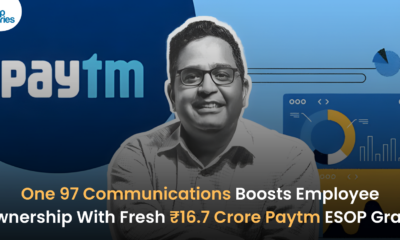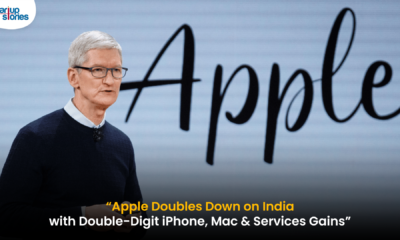Entrepreneur Stories
Samsung Pay Finally Launched In India, Watch Video To Know How It Works!

Andriod phone maker Samsung finally launched its digital payment application “Samsung Pay” in India on Wednesday. This is to meet the needs of Indians as they tend to shift slowly to various online payments mode after the demonetization act hit India.
Samsung had granted access to its select users and also tAndriod phone maker Samsung finally launched its digital payment application “Samsung Pay” in India on Wednesday. This is to meet the needs of Indians as they tend to shift slowlyhe users of their Galaxy Note 5, Galaxy S7, Galaxy S7 Edge, Galaxy A5, Galaxy A7 and Galaxy S6 Edge+ can register to get early access.
Watch the video here:
Senior Vice President of Samsung India Electronics Pvt.,Ltd., Asim Warsi spoke about Samsung’s latest app and how the Indian unit worked almost for a year to customize Samsung Pay for the Indian market which also includes transactions through debit cards and mobile wallets for the first time.
Account holders of Axis Bank, HDFC, ICICI, SBI, and Standard Chartered Banks can avail this service of Samsung Pay. American Express and Citibank will be soon added to this list.
It is both NFC (Near Field Communication) as well as MST ( Magnetic Secure Transmission) compatible. Therefore, it works with any card swiping or reading machine, where the card in the phone just needs to be waved over the terminal.
How to get access to this?
A user must link their bank account and card to the Samsung Pay app on any of the above said Samsung smartphones.
After it is done, payments can be made by firing up the app on the phone and bringing the smartphone close to the NFC- enabled point-of-sale (POS) machine.
Once the vendor has entered the amount to be payable on the POS machine, this payment will be authenticated through the user’s fingerprint or a 4-digit PIN entered on the Samsung Pay app.
However, a lot of Samsung’s low end phones will not be compatible with the app.
Entrepreneur Stories
Zupee Bolsters Short-Video Play with Vertical TV Acquisition Under INR 40 Cr

Delhi NCR-based gaming startup Zupee has acquired Mumbai-based microdrama platform Vertical TV in a deal valued under INR 40 Cr. This move strengthens Zupee Studio, its short-video arm launched in September 2025, by integrating Vertical TV’s expertise in bite-sized dramas like romance and thrillers.
Facing challenges from India’s 2025 real-money gaming ban, Zupee valued at $1 Bn after raising $120 Mn has pivoted to non-gaming content, including recent layoffs of 40% of its workforce. The acquisition builds on its November 2025 purchase of Australian AI firm Nucanon for interactive storytelling, targeting its 200 Mn+ users with engaging, mobile-first formats.
This deal underscores the rising microdrama trend in India, helping Zupee diversify amid regulatory pressures and compete in the short-video space dominated by quick, shareable content for on-the-go audiences.
Videos
T.N. Seshan: The Fearless Reformer Who Redefined Indian Democracy

T.N. Seshan’s name stands tall in India’s history as the man who transformed the nation’s electoral system with extraordinary courage and integrity. Born in 1932 in Kerala, Seshan grew up with values of discipline, education, and service to the nation — virtues that shaped his illustrious journey. From his early brilliance at Madras Christian College to his advanced studies in public administration at Harvard University, Seshan’s path reflected rare determination and intellect. Joining the Indian Administrative Service in 1955, he built a reputation as a no‑nonsense officer committed to efficiency and honesty, serving in key roles such as Secretary of Defense and overseeing vital national programs.
As the Chief Election Commissioner of India in 1990, T.N. Seshan sparked a new era of electoral integrity. In a system once marred by corruption, violence, and malpractice, Seshan brought order, fear, and respect through his groundbreaking reforms. He introduced voter ID cards, imposed strict spending limits on campaigns, and insisted on transparency at every level of the election process. Despite criticism from political circles that labeled him dictatorial, his relentless pursuit of fairness empowered every citizen to vote fearlessly. Under his leadership, the Election Commission became a symbol of strength and integrity in Indian democracy.
Seshan’s passing in November 2019 marked the end of an era, but his message continues to resonate across generations. Leaders from every corner of the country mourned the loss of the man who restored faith in free and fair elections. His enduring legacy reminds us that true leadership lies not in wielding power, but in serving people with honesty, courage, and conviction. T.N. Seshan’s life remains a timeless inspiration a reminder that democracy thrives only when its citizens are vigilant, responsible, and fearless.
Entrepreneur Stories
Indian Man Quits JPMorgan, Takes 70% Pay Cut to Launch $6 Million Startup

Leaving behind a high-paying job at JPMorgan, an Indian entrepreneur embraced a 70% salary cut to pursue true purpose and passion in the startup world. Disenchanted with what he described as a “robotic” corporate routine, he sought meaningful work that made a real impact. This pivotal decision marked the beginning of his new journey, one focused on value creation rather than titles and corporate perks.
Powered by resilience and fresh perspective, the entrepreneur launched his own startup, prioritizing innovation and hands-on solutions. The road was challenging, but his vision resonated with the market: the startup quickly gained traction and raised $6 million—an impressive acknowledgement of its potential in a competitive landscape. Every hard lesson from early setbacks and bootstrapping paid off in real customer growth and investor confidence.
Today, his journey stands as an inspiring example for professionals seeking authentic success outside the corporate grind. By trading comfort for creative freedom, he grew a venture that solves important problems, generates jobs, and builds wealth beyond just salary. For ambitious founders, his story highlights the power of risk-taking, adaptability, and relentless focus on impact in India’s thriving startup ecosystem.














Rothejii
May 25, 2025 at 9:47 am
Explore the ranked best online casinos of 2025. Compare bonuses, game selections, and trustworthiness of top platforms for secure and rewarding gameplaycasino slot machine.
GO88
November 8, 2025 at 3:17 am
Tham gia cộng đồng game thủ tại Go88 để trải nghiệm các trò chơi bài, poker phổ biến nhất hiện nay.
iwin
November 8, 2025 at 11:14 pm
iwin – nền tảng game bài đổi thưởng uy tín, nơi bạn có thể thử vận may và tận hưởng nhiều tựa game hấp
谷歌外推
November 9, 2025 at 11:05 am
采用高效谷歌外推策略,快速提升网站在搜索引擎中的可见性与权重。谷歌外推
站群程序
November 11, 2025 at 6:06 pm
搭载智能站群程序,自动化搭建与管理,为SEO项目提供核心驱动力。站群程序
MM88
November 12, 2025 at 6:20 pm
Khám phá thế giới giải trí trực tuyến đỉnh cao tại MM88, nơi mang đến những trải nghiệm cá cược thể thao và casino sống động.
MM88
November 18, 2025 at 3:37 am
Với giao diện mượt mà và ưu đãi hấp dẫn, MM88 là lựa chọn lý tưởng cho các tín đồ giải trí trực tuyến.